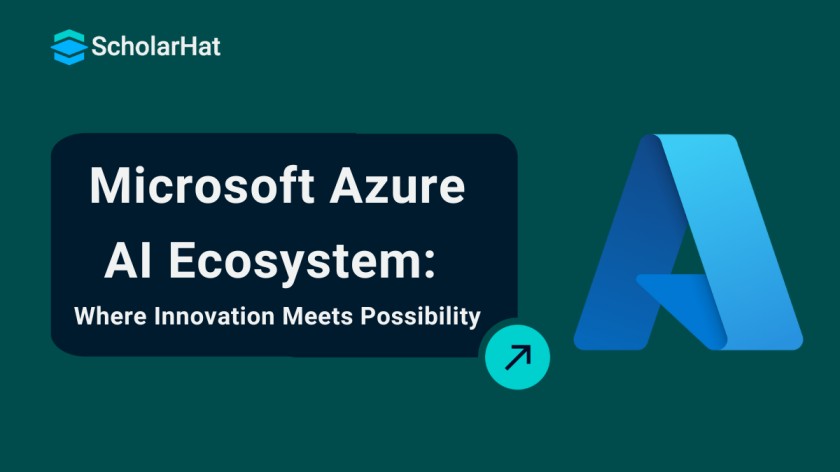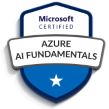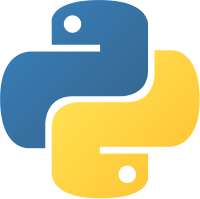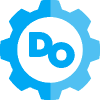06
FebExploring Microsoft's AI Ecosystem: Innovation and Integration
Microsoft’s AI Ecosystem refers to the collection of AI tools, platforms, services, and frameworks provided by Microsoft to enable businesses, developers, and individuals to build, deploy, and manage AI-powered applications efficiently.
In this tutorial on AI, you’ll get a closer look at powerful tools like GitHub Copilot, Power Platform, and Microsoft 365 Copilot, and how they’re making everyday work smarter and faster. Enroll in ScholarHat's Free Azure AI-900 Certification Course start mastering AI with hands-on practice
What is Microsoft’s AI Ecosystem?
Microsoft's AI Ecosystem offers a complete set of platforms, services, and tools for creating, implementing, and monitoring AI solutions on a large scale. It comes with developer tools like Visual Studio and GitHub Copilot, Azure AI services like Azure OpenAI, Cognitive Services, and Machine Learning, and interaction with Microsoft products like Dynamics 365 and Office 365. Computer vision, generative AI, and natural language processing are only some of the many AI capabilities supported by the ecosystem.
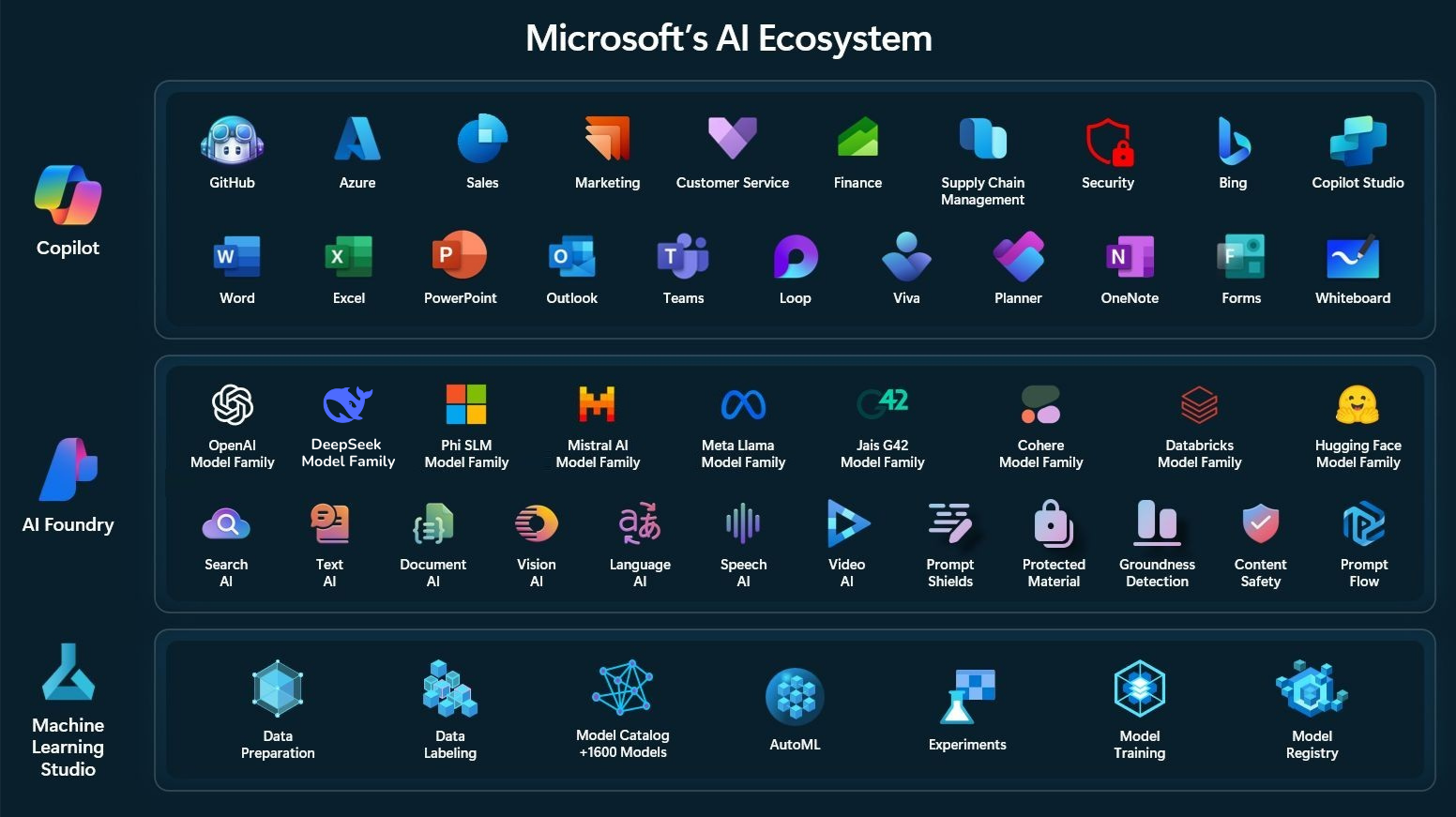
Purpose of Microsoft’s AI Ecosystem
- AI as a Platform vs. Product: Provides AI as a strong platform for creating unique applications rather than merely pre-made ones, encouraging creativity and adaptability.
- Encouraging developers, end users, and enterprises: Enables all stakeholders to use AI to solve problems in the real world by offering frameworks, tools, and APIs.
- Scalability, Integration, & Compliance at the Core: Integrated with Microsoft and third-party systems, designed for enterprise scalability, and integrated with global standards such as GDPR.
- Accelerating AI Adoption: Provides pre-trained models, low-code/no-code tools, and ready-to-use services to assist organisations in quickly implementing AI technology.
- Encouraging Responsible AI: Promotes the responsible application of AI technologies by integrating moral precepts like accountability, transparency, and justice.
- Facilitating Industry-specific Solutions: Provides customised AI services and templates to address domain-specific requirements for industries such as manufacturing, healthcare, finance, and retail.
- Increasing Productivity through AI Integration: AI is included in commonplace Microsoft products (like Dynamics 365 and Microsoft 365 Copilot) to improve user productivity and decision-making.
- Enhancing a Collaborative Ecosystem: Facilitates the sharing, learning, and co-creation of solutions by bringing developers, partners, and companies together via platforms including as GitHub, Azure Marketplace, and AI communities.
Why Microsoft’s AI Ecosystem Matters?
Microsoft's AI Ecosystem is significant because it offers enterprise-level integration and scalability, enabling AI to be used with current tools and platforms. It places a strong emphasis on developing AI ethically and responsibly, guaranteeing compliance, transparency, and trust. Additionally, it enables developers, companies, and end users to innovate more quickly and find clever answers to real-world problems.
Microsoft Copilot
Designed to improve productivity and optimise processes, Microsoft Copilot is an AI-powered assistant that is integrated with Microsoft 365 programs, including Word, Excel, and Outlook. It helps users by creating content, summarising information, automating activities, and offering data insights by utilising massive language models, such as OpenAI's GPT. By managing repetitive chores, increasing productivity, and encouraging creativity, Copilot helps people work more intelligently.

Key Components of Microsoft Copilot’s AI Ecosystem
- Office 365 Integration: Increases user productivity and simplifies work by integrating AI into Microsoft Office applications like Word, Excel, PowerPoint, and Outlook.
- company Verticals: Optimises operations and decision-making by providing AI-driven solutions for essential company processes like supply chain, marketing, finance, sales, and customer service.
- Tools for Collaboration: A complete set of tools that make collaboration, communication, and project management easier, including Teams, Viva, Loop, Planner, OneNote, Forms, and Whiteboard.
- Copilot Studio: Enables teams to develop intelligent workflows that are suited to their requirements by giving enterprises low-code/no-code tools to create personalised AI Copilot solutions.
Benefits of Microsoft Copilot
- Increased Productivity through Automation: By automating monotonous operations, users can concentrate on high-value jobs, which increases productivity overall.
- Data-Driven Decision-Making: Makes use of AI to deliver practical insights that facilitate well-informed decisions derived from data analysis.
- Simplified Communication: Enhances communication with the incorporation of AI capabilities that help with effective email, meeting, and messaging management.
- Enhanced Team Collaboration: AI-powered tools for real-time sharing, co-authoring, and team coordination enable more seamless teamwork.
- Personalised Learning & Development: Enables teams and individuals in more efficiently developing their abilities by customising learning paths and suggestions.
- Effective Content development: AI helps with rapid content drafting, editing, and refinement, saving time on content development activities.
- Improved Resource Management: Enhances project and task management by optimising resource allocation and utilisation.
- Enhanced Security and Compliance: Uses AI-powered security measures and makes sure that all workflows adhere to legal requirements.
- Improved Inclusivity and Accessibility: Offers AI-driven accessibility capabilities that increase the use of tools for a wide variety of users.
- Cost savings through process optimisation: Lowers operating costs and boosts efficiency by simplifying workflows and automating operations.
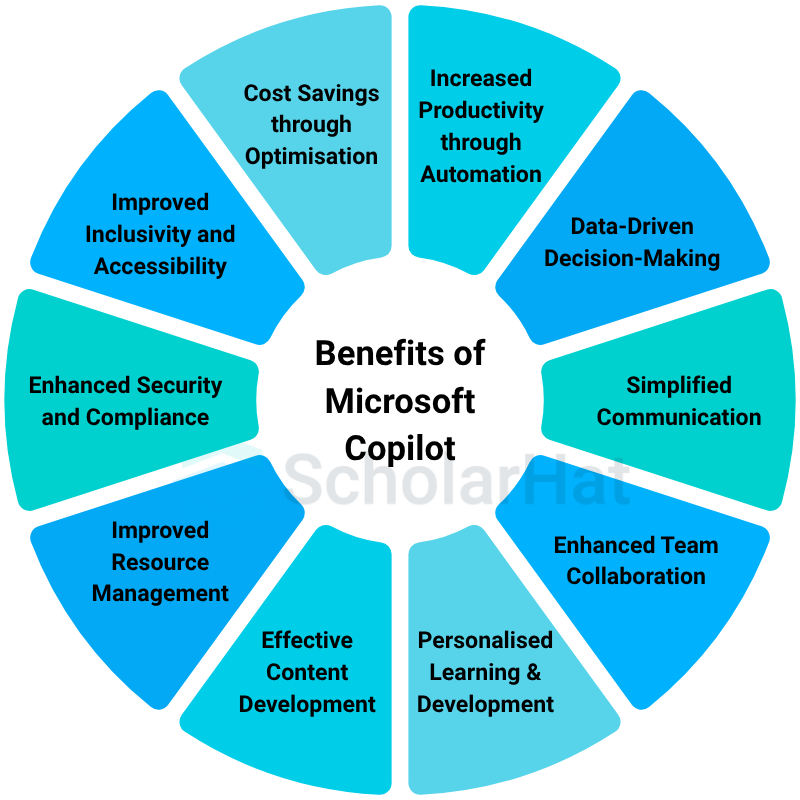
AI Foundry
A platform called AI Foundry gives companies the ability to create, develop, and implement unique AI solutions that are suited to their particular requirements. It offers frameworks, templates, and tools that automate the development process so businesses can use AI to drive new ideas and digital transformation. Because AI Foundry uses a low-code/no-code feature, both technical and non-technical users can use AI.
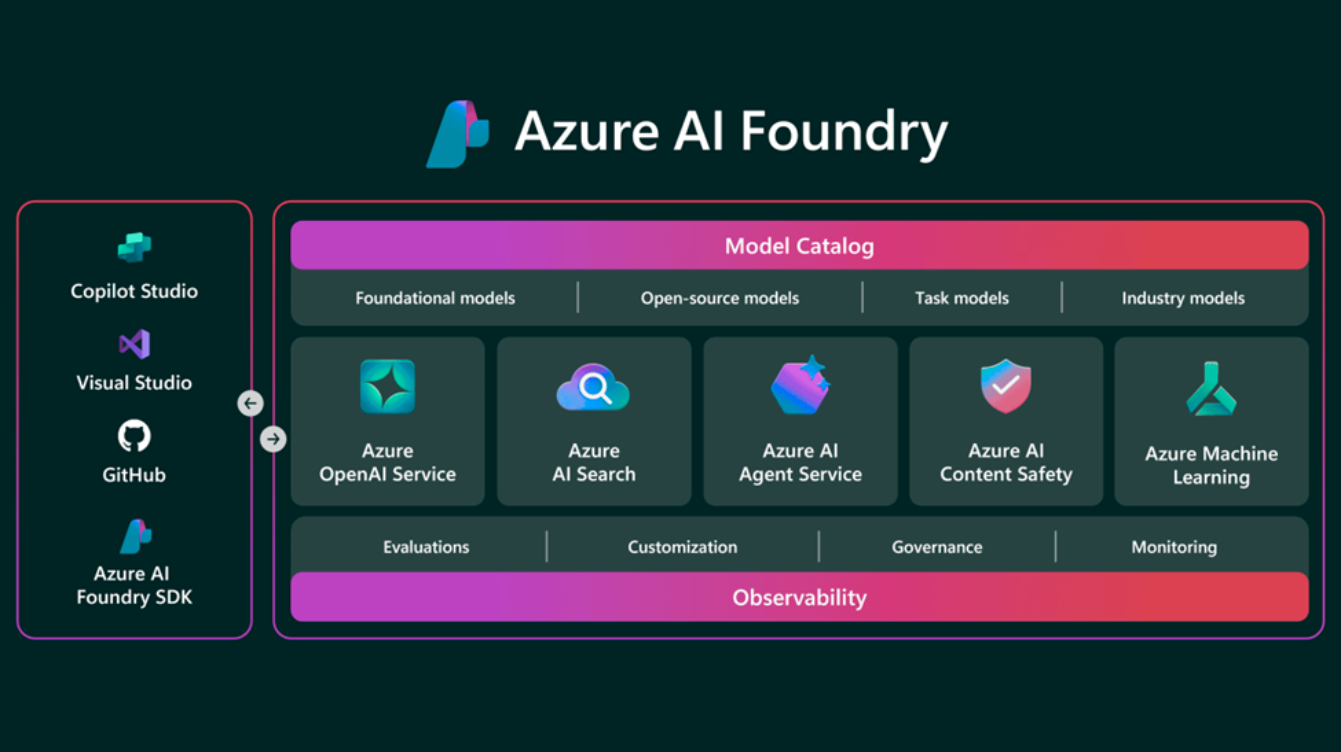
AI Model Families
- OpenAI: A leading AI research organization focused on developing advanced OpenAI technologies, including large language models like ChatGPT.
- DeepSeek: AI-powered platform with a focus on deep learning solutions for predictive modelling, pattern recognition, and data analysis.
- Phi SLM: A machine learning framework with an emphasis on scalability and flexibility that is intended for effective AI model training and scaling.
- Mistral AI: A business dedicated to creating state-of-the-art AI algorithms, especially in the fields of machine learning and natural language processing.
- Meta Llama: The goal of Meta's AI project was to develop and implement advanced, large-scale AI models for a range of uses, including language comprehension.
- Jais G42: An AI technology business that uses powerful data analytics to create AI-driven solutions for sectors including healthcare, banking, and logistics.
- Cohere: A platform that provides AI tools and APIs to help companies incorporate big language models for natural language processing (NLP) workloads into their apps.
- Databricks: A unified platform for data analytics that integrates AI and big data for workflows in machine learning, data science, and data engineering.
- Hugging Face: An AI research firm that specialises in natural language processing and offers open-source tools, frameworks, and models.
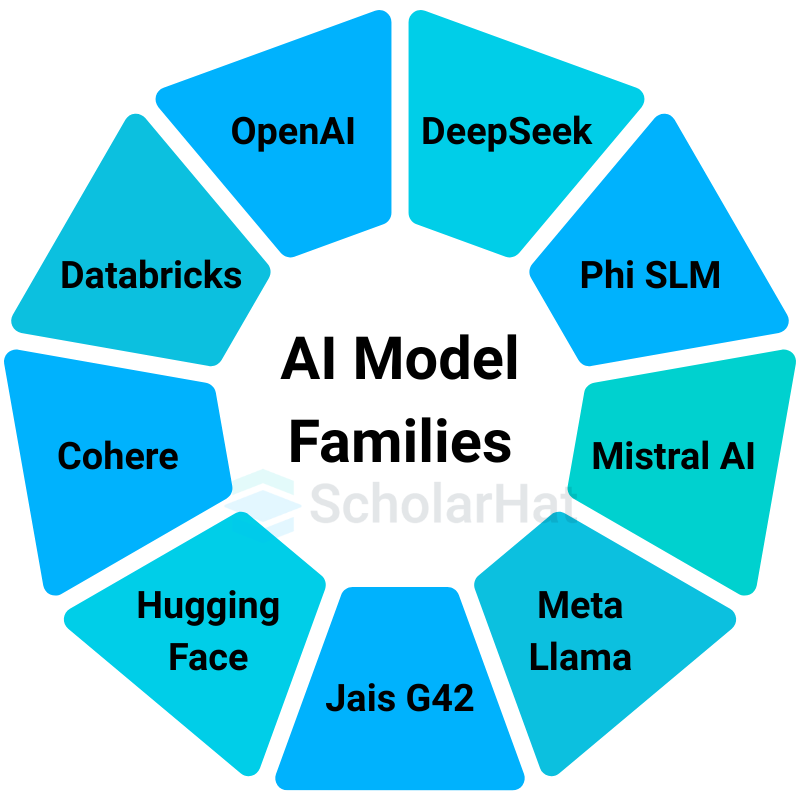
| Read More: ChatGPT vs DeepSeek: Which AI Model is Better for You? |
Specialized AI Domains
- Text AI: AI tools include sentiment analysis and natural language processing (NLP) that work towards processing, comprehending, and producing text.
- Document AI: AI programs created to automatically extract data and manage documents by extracting, analysing, and processing information from them.
- Search AI: AI-driven technologies that improve search efficiency by better comprehending queries, increasing relevancy, and customising results.
- Vision AI: AI that gives computers the ability to recognise and comprehend visual data from their environment, including objects and images.
- Language AI: AI that can understand, produce, and translate human languages; this includes voice assistants, chatbots, and translation software.
- Speech AI: Artificial intelligence (AI) tools that interpret and process spoken language to enable voice commands, speech synthesis, and speech recognition.
- Video AI: AI programs created to create, analyse, and interpret video content. Some of these programs include video summarisation, object tracking, and scene identification.
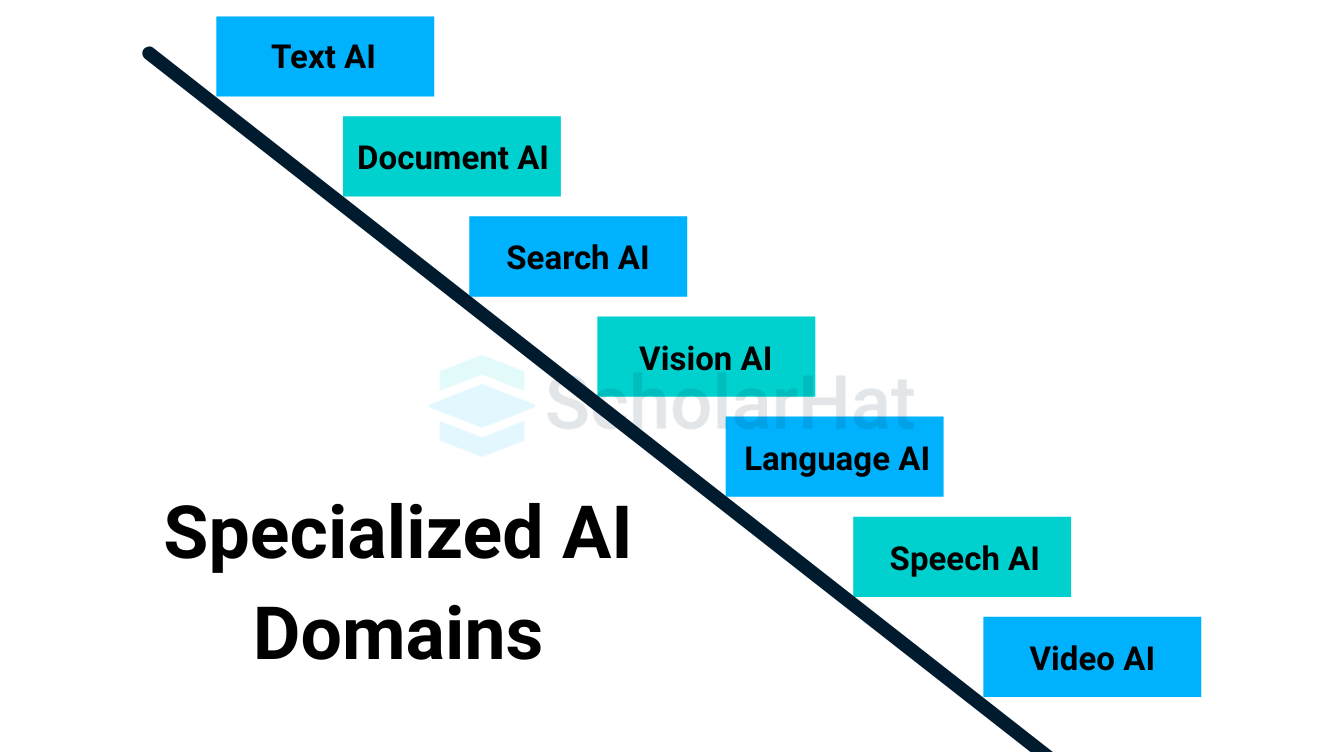
Trustworthy AI: Safety, Ethics, and Compliance
AI Safety Tools
Prompt Shields
AI safety solutions that filter or block risky prompts during user interactions to prevent biased or destructive outputs. They serve as a safeguard to guarantee that the produced content complies with moral principles and steers clear of negative consequences.
Protected Materials
Tools that guarantee that private information or intellectual property is not misused or revealed when training AI models or creating content. These tools support data security and privacy.
Groundness Detection
AI safety technologies that assess created content's factual accuracy and dependability, spotting unsubstantiated claims, false information, or speculative remarks to make sure the content is consistent with accepted facts.
Content Safety Monitoring
A suite of tools for continuously observing and evaluating content produced by AI to identify and remove any potentially dangerous, offensive, or improper content. It contributes to keeping both users and creators secure.
What is Responsible AI?
The development of AI systems at Microsoft with fairness, safety, privacy, inclusivity, openness, and accountability at its core is known as "Responsible AI." Microsoft places a high priority on the ethical deployment of AI by upholding fundamental values and internal governance procedures. The company seeks to advance society while reducing harm and promoting confidence in AI technology.
Responsible AI Principles
All of Microsoft's artificial intelligence plans are based on these six principles:
- Fairness: Microsoft aims to develop AI systems that guarantee equitable access to resources and services, lowering the possibility of cultural or ethnic stereotyping.
- Safety and Reliability: AI systems prioritise safety and minimise harm while operating as intended and in line with Microsoft's core principles.
- Security and Privacy: Microsoft maintains stringent data protection procedures, guaranteeing that AI systems are created without violating either.
- Inclusivity: To guarantee AI systems are created to empower and benefit people worldwide, Microsoft collaborates with a variety of communities, particularly marginalised minority groups.
- Transparency: To promote understanding and trust, developers of AI systems should be forthright about how AI works and its limitations.
- Accountability: Microsoft ensures adherence to its commitments and principles throughout the whole development process, holding itself responsible for the effects of AI technology.
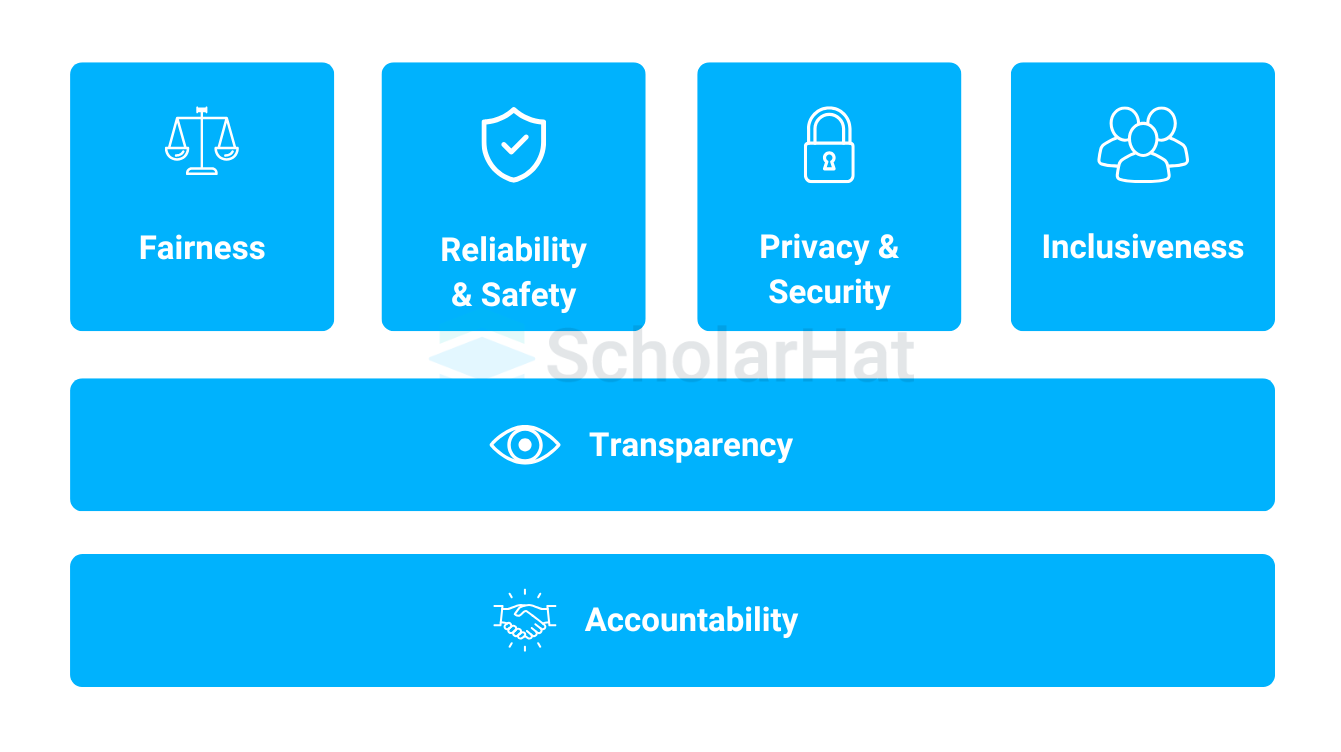
Microsoft's Responsible AI standard
Microsoft's Responsible AI Standard develops corporate policies to guarantee that AI systems follow moral standards. To improve the standard's efficacy, inclusivity, and flexibility in response to legislative changes, Microsoft regularly updates it by incorporating strong governance procedures and consulting professionals. This framework promotes industry-wide trust in AI technology and guarantees responsible AI development.
Machine Learning Studio
Microsoft Azure offers Machine Learning Studio, a web-based integrated development environment (IDE) for creating, honing, and implementing machine learning models. With its drag-and-drop interface, users of all skill levels can easily design processes, experiment with data, and apply machine learning solutions without requiring a deep understanding of code.
| Read More: Azure Machine Learning Studio: A Complete Guide for AI Developers |
Tools for Data Scientists and ML Engineers
- TensorFlow: A popular open-source toolkit for machine learning and numerical computing that is used to create and train deep learning models.
- PyTorch: A popular open-source and adaptable machine learning library for research and production models, it offers dynamic computing.
- Scikit-learn: A Python package that supports several machine learning methods and offers straightforward and effective tools for data mining and analysis.
- Jupyter Notebooks: An open-source online tool for producing and exchanging documents with narrative text, equations, live code, and visualisations.
- Azure Machine Learning: Microsoft's cloud-based platform that facilitates automated machine learning and collaboration while enabling the development, training, and large-scale deployment of machine learning models.
- Google Colab: A free cloud-based platform that allows you to run Python code in a Jupyter notebook environment and gives you access to GPUs for machine learning model training.
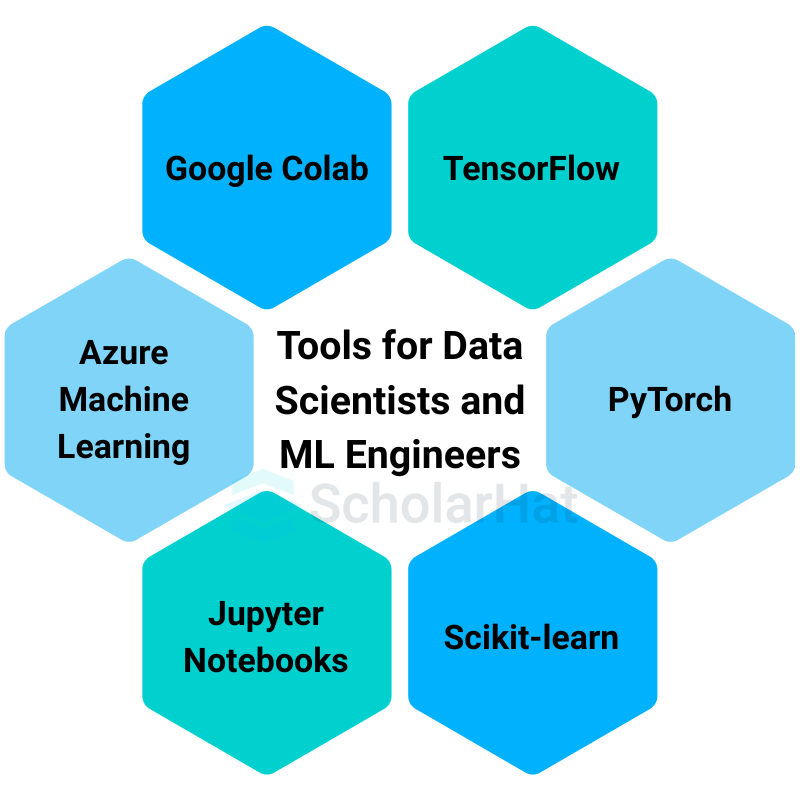
Key Components of Machine Learning Studio
- Data Preparation & Labelling: Procedures and tools for cleaning, converting, and labelling datasets to guarantee their accuracy and quality for machine learning models.
- Model Catalog(1600+ pre-trained models): This is a library of more than 1,600 pre-trained models that may be used for a variety of machine learning tasks, saving time when developing new models.
- AutoML for Rapid Prototyping: Automated machine learning technologies that allow for rapid model prototyping without requiring in-depth knowledge of techniques free up users to concentrate on solving problems.
- Model Training, Experiments, and Registry: A framework for training machine learning models, conducting experiments, and keeping them in a model registry for version control and convenient deployment.
Developer-Centric AI Innovation
Support for Open-Source Tools: Python, PyTorch, ONNX
Python's extensive ecosystem, which includes libraries for machine learning tasks like TensorFlow and Scikit-learn, makes it perfect for AI development. Platform compatibility is ensured by PyTorch & ONNX, which give developers versatile tools for deep learning and model interchangeability.
Smooth Connectivity with Azure AI, VS Code, and GitHub
Teams can collaborate more effectively on machine learning projects because of GitHub's version control and collaboration features. An intuitive environment for developing, debugging, and deploying machine learning models at scale is offered by Visual Studio Code in conjunction with Azure AI services.
SDKs and Prompt Flow for Quick Development
The model development lifecycle is accelerated by Prompt Flow, which makes it simple for developers to plan and coordinate AI tasks. SDKs reduce development time and increase flexibility by providing pre-built components, libraries, and APIs that make integrating with various AI services easier.
AI Adoption in Fortune 500 Companies
Increased Efficiency and Automation
- In industries including manufacturing, data analysis, and customer service, Fortune 500 businesses are using AI to automate repetitive operations, increasing operational efficiency and lowering human error.
- By evaluating large volumes of data, improving corporate procedures, and optimising supply chains, AI-powered automation technologies facilitate quicker decision-making.
Improved Personalisation and Customer Experience
- AI helps businesses better understand the interests and behaviours of their customers by personalising their experiences through chatbots, recommendation engines, and predictive analytics.
- Companies are using AI to promote consumer satisfaction and engagement by offering customised solutions, which increases revenue and loyalty.
Competitive Analysis: Microsoft vs Other AI Giants
| Feature | Microsoft AI | Google Cloud AI | AWS Bedrock | IBM WatsonX |
|---|---|---|---|---|
| Core Offering | Comprehensive AI services across multiple industries | AI and machine learning tools for developers | Pre-built models and tools for generative AI | AI solutions for enterprise applications |
| Key Strengths | Integration with Azure, GitHub, and VS Code, AutoML | Expertise in deep learning, TensorFlow, and Google AI | Scalable, flexible, and high-performance AI solutions | Specialized AI for business and industry insights |
| Focus Area | Enterprise AI, Open-source tools, and custom models | Advanced ML models and cloud-native AI applications | Generative AI with industry-specific applications | Data analysis, AI insights, and business automation |
| Deployment and Integration | Seamless with Microsoft tools like Teams and Office 365 | Strong integration with Google’s ecosystem | Strong integration with AWS cloud services | Works well with IBM’s enterprise solutions |
| Pre-Trained Models | 1600+ pre-trained models in Azure AI | Extensive pre-trained models, including Vision AI | Access to a range of foundational models | Provides pre-trained models for various business use cases |
| Customization and Flexibility | High flexibility with custom Copilot development and AutoML | Focus on deep learning customization with TensorFlow | Customizable with various AI tools and frameworks | Strong customization options for enterprise solutions |
| Key Industries Served | Finance, Healthcare, Retail, Manufacturing, and more | Healthcare, Retail, Education, Media, and more | E-commerce, Healthcare, Financial Services | Finance, Healthcare, Retail, and IT services |
| Pricing Model | Pay-as-you-go via Azure pricing | Pay-as-you-go via Google Cloud pricing | Pay-as-you-go based on usage and infrastructure | Custom enterprise pricing based on requirements |
Integration with Third-Party Ecosystems
Connecting and using external platforms to improve AI capabilities is known as integration with third-party ecosystems:
- Hugging Face & OpenAI: Combining Hugging Face's models with OpenAI's enables the simple implementation of cutting-edge AI techniques in a range of applications.
- Integrating GitHub Copilot into Third-Party IDEs: This improves the developer experience by integrating GitHub Copilot into IDEs such as VSCode or JetBrains to offer AI-powered code recommendations.
- Azure Hybrid & Multi-Cloud AI Deployment: Azure provides enterprises with flexibility and scalability by enabling the deployment of AI solutions across various cloud platforms.
Future of Microsoft’s AI Ecosystem
What’s coming in 2025 and beyond?
Microsoft intends to advance AI-powered solutions and include generative AI into more of its products by 2025. This includes adding AI-powered content creation and automation features to Microsoft 365 and growing its Azure AI portfolio to accommodate more complicated use cases and a wider range of businesses.
| Read More: Ethics & Future of AI |
Microsoft's role in generative AI regulation and research
Microsoft is actively engaged in generative AI technology development and regulation. As the leader in AI research, it works with governments and academic institutions to develop legal frameworks and ethical standards that guarantee the responsible use of AI while furthering the scientific advancement of the subject.
Real World Use Cases
Finance
- Fraud Detection: Uses machine learning to detect unusual transactions and prevent fraud.
- Algorithmic Trading: Automated systems make fast, data-driven decisions for stock trading.
- Credit Scoring: Models assess creditworthiness based on financial history.
Healthcare
- Predictive Analytics: Analyzes patient data to predict diseases and enable early intervention.
- Telemedicine: Enables remote consultations, expanding access to healthcare.
- Medical Imaging: AI analyzes images for faster, more accurate diagnoses.
Manufacturing
- Predictive Maintenance: Sensors predict equipment failure to reduce downtime.
- Supply Chain Optimization: AI optimizes inventory, logistics, and demand forecasting.
- Robotics: Automates repetitive tasks, increasing efficiency and consistency.
Retail
- Personalized Recommendations: Suggests products based on customer behavior.
- Inventory Management: Tracks stock in real-time to optimize restocking.
- Sentiment Analysis: Analyzes customer feedback to improve products and services.
Conclusion
Microsoft's AI ecosystem provides developers and businesses with a strong platform on which to create innovative, scalable, and moral AI solutions.
You can level up your career with the ScholarHat's Azure AI Engineer Certification and Azure AI Foundry Certification which offers hands-on learning with Azure, Copilot, and GitHub, giving you real-world experience
Take our Artificialintelligence skill challenge to evaluate yourself!

In less than 5 minutes, with our skill challenge, you can identify your knowledge gaps and strengths in a given skill.

